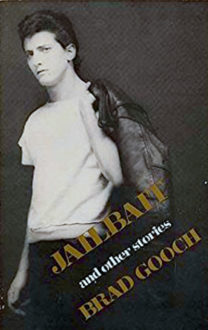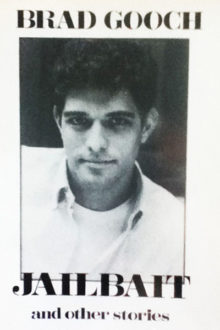 Jailbait and Other Stories
Jailbait and Other Stories
by Brad Gooch
Published by Sea Horse Press
Published April 1984
Fiction (short stories)
167 pgs. • Find on Amazon.com • WorldCat
Reviewed by Stephen O. Murray
August 26, 2017.
I’m somewhat puzzled that Brad Gooch’s first prose book, Jailbait and Other Stories (1984), was published by Felice Picano’s Sea Horse Press, a member of the Gay Presses of New York.
The sex in the stories is heterosexual, though the typical setup has one young man yearning for the embrace (etc.) of another who lives with a young woman. (Even the yearning homosexual is absent in “Airport,” “Oh That Magic Feeling,” “Motel,” and “I Watched You Suffer,” not that the heterosexual couples have much in the way of joy either.)

In his extremely windy introduction, Dennis Cooper invokes some West Coast New Narrative writers “house cleaning the fictional surface after a decade where the bold experiments with language rampant in the late Sixties and Seventies (practiced by Barth, Bartheleme, Pynchon, and their successors) have become merely glib and logorhoeic [sic].” Gooch’s stories set in the early 1980s have glib descriptions of characters’ external appearances and a lot of dialogue (set up as in printed plays with lines preceded by the name of the speaker and a colon). Some characters recur, notably the nocturnal TV repairman Michael.
The first story, “Spring,” reaches back to earlier adolescence with a character sharing the author’s given name yearning for Bobby’s thick cock and big balls. He concocts a way to touch them with his tongue. Caleb is a cocktease, humiliating the Mr. Brown of a story titled “Mr. Brown. Harvey flirts with the married suburban Jeff in “Black Square,” Doug with Michael in “TV.” There are intimations that Russ, who is on an extended stay on a Maine island, is going to get it on with local hunk Jason (who has just learned his girlfriend is pregnant), though sometime after the end (but not ending) of “Maine.” It does not occur to any of the yearning for same-sex love characters (who are mostly in NYC) to find any gay community or established cruising locales or institutions.
The title story is based on a 1972 TV movie of the same name by Rainer Fassbinder without Fassbinder’s prison setting or discussions of the worst sex the cellmates ever had and has less smoldering, frustrated homoeroticism than either Fassbinder’s quickie or some of Gooch’s other stories. The cover, however, has some “jailbait,” Robert Mapplethorpe’s photo of his then 17-year-old brother in Mapplethorpe costume: white t-shirt and black-leather jacket.
The back cover promises “the primitive energy of storytelling,” a promise that the stories fail to deliver on, though it is right about “Don’t expect complicated plots, in-depth conversation, moments of acute psychological analysis,” and I’m not convinced that the mostly banal dialogue is “pared-down.” “Undertow” of desire, there is, for sure. It would have been difficult to predict that Gooch would someday write a biography of Flannery O’Connor. There is a lack epiphanies and of endings. (Nor are there the grotesqueries common in fiction by O’Connor or Dennis Cooper.) The vignettes are not random but don’t have much in the way of points. Illuminations of the frustrated longings of some youngish people (most of them straight-identified) in an era before AIDS or at least before any awareness of AIDS, it does offer.
©2017, Stephen O. Murray

